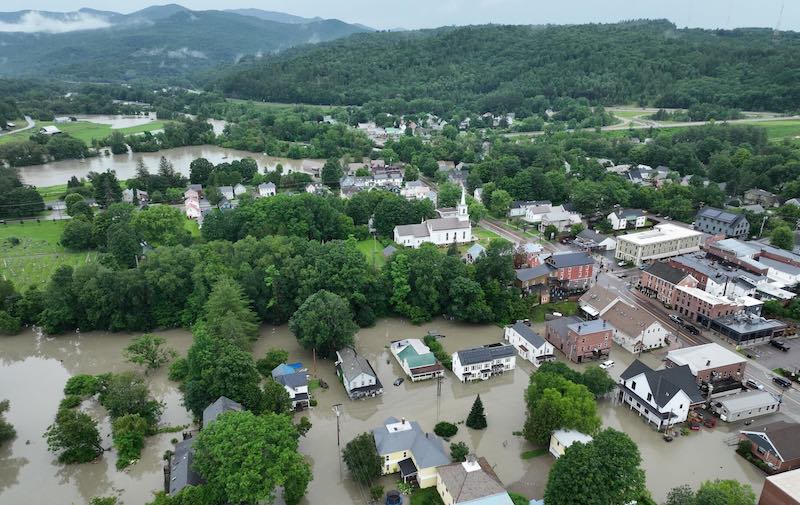
A climate superfund can help clean up communities like Montpelier, Vermont, one of many towns flooded in torrential rains that hit the state in 2023. Photo: Vince Franke
It could be a game-changer. Instead of families and businesses struggling to pay to rebuild a home or business after an extreme storm caused by climate change, Vermont, in passing the Climate Superfund Act in May 2024, will make fossil fuel companies pay their fair share of cleanup.
“It’s a first-of-its-kind law that will likely inspire more states to follow,” says Elena Mihaly, vice president of CLF Vermont.
Many had feared that a skeptical governor would veto the law pushed by CLF and our partners. But that didn’t happen, and it’s easy to see why. In recent years, Vermont has been walloped by extreme weather, especially in 2023, when climate change-driven torrential rains led to catastrophic flash and river flooding, not once but twice. Heavy rains also pelted the state this past July, resulting in more floods. It’s only logical that at some point, flood-weary families and businesses, along with taxpayers stretched to the limit, would turn to the basic principle we all learned in kindergarten: When you make a mess, you clean it up.
So, it’s up to fossil fuel companies to clean up their mess. They have known for decades that their products were causing climate change, yet they continued to push their polluting products for another dollar. Now, some of those dollars must be spent to help fix the problem they created.
But how would it work?
The EPA’s Superfund is a Model
The Vermont law was modeled after the EPA’s existing Superfund program, which became law in 1980 with the discovery that a Niagara Falls community had been built at the site of a toxic chemical dump. Since then, the law has required companies responsible for contaminating the environment to help clean up their messes. One prominent example of a Superfund site is the country’s largest–the Hudson River. For 30 years, two General Electric manufacturing plants discharged approximately 1.3 million pounds of toxic chemicals into the river, where they settled along the river bottom. GE spent $1.7 billion dredging 310,000 pounds of these chemicals from stretches of the river.
In the case of the Climate Superfund Law, fossil fuel companies must retroactively pay for clean-up and damages based on their carbon emissions between 1995 and 2024. First, the Vermont State Treasurer will tally the costs of past, current, and likely climate effects caused by major fossil fuel companies over a nearly 30-year period. Second, the Secretary of the Agency of Natural Resources will decide which Big Oil companies should pay. The total cost will be divided among those companies deemed responsible. The money will be used for clean-up and to fund resilience measures necessary to cope with floods, storms, crop damage, wildfires, and more.
Large Companies are Affected
Only the largest fossil fuel companies will be affected. A company must have been responsible for more than one billion metric tons of carbon emissions globally between 1995 and 2024 and have a physical or economic connection to the state.
A hypothetical offered by Lee Wasserman, director of the Rockefeller Family Fund, which also pushed and financed support of the Vermont bill, is this:
“Assume, as a hypothetical, that the climate damages and adaptation costs to Vermont total $3 billion and that Chevron’s share of greenhouse gas pollution during the measuring period is 3 percent of the global total,” he wrote in the New York Times. “Chevron would be assessed at $90 million, a tiny fraction of the more than $21 billion in profits the company made in 2023 alone.”
Although the exact timeline is unclear, Vermont hopes to have money flowing into the state by 2028.
Big Oil Will Fight Back
Of course, CLF’s Mihaly expects Big Oil to challenge this law to protect its billions in profits. When it does, it will have a fight on its hands. Vermont is only the first of a growing movement to hold Big Oil accountable. Massachusetts, Maryland, and California are considering similar Climate Superfund bills. The New York State Senate also passed its own Climate Superfund Act in June (which, at the time of this writing, awaited the governor’s signature). As the country reels under the effects of more supercharged hurricanes, tornados, wildfires, and heatwaves, more states—and countries—will likely join the movement. U.S. senators have already calculated that a federal climate superfund would raise $500 billion over 10 years.
“Vermont faces astronomic costs in its recovery from and preparedness for climate disasters,” says Mihaly. “This law is an urgently needed, lawful, scientific means of holding big oil companies accountable to pay their fair share of these damages given that they are at the root cause of the problem.”
The new law means that, finally, Vermonters will no longer be expected to shoulder the effects of climate change alone.



